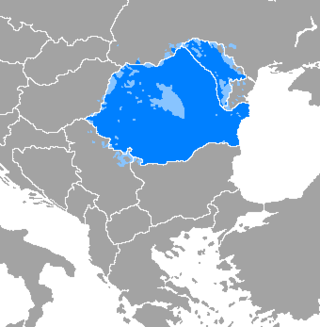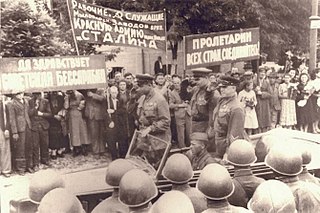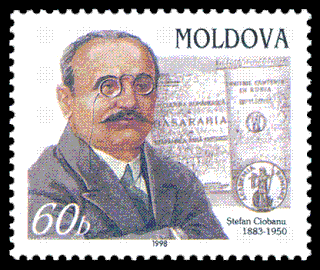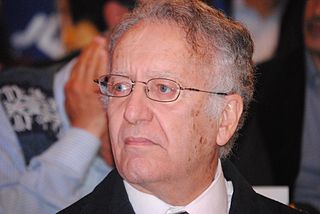
Romanian is the official and main language of Romania and Moldova. Romanian is part of the Eastern Romance sub-branch of Romance languages, a linguistic group that evolved from several dialects of Vulgar Latin which separated from the Western Romance languages in the course of the period from the 5th to the 8th centuries. To distinguish it within the Eastern Romance languages, in comparative linguistics it is called Daco-Romanian as opposed to its closest relatives, Aromanian, Megleno-Romanian, and Istro-Romanian. It is also spoken as a minority language by stable communities in the countries surrounding Romania, and by the large Romanian diaspora. In total, it is spoken by 25 million people as a first language.

The Transnistria War was an armed conflict that broke out on 2 November 1990 in Dubăsari between pro-Transnistria forces, including the Transnistrian Republican Guard, militia and neo-Cossack units, which were supported by elements of the Russian 14th Army, and pro-Moldovan forces, including Moldovan troops and police.

Moldovans, sometimes referred to as Moldavians, are a Romanian-speaking ethnic group and the largest ethnic group of the Republic of Moldova and a significant minority in Romania, Italy, Ukraine and Russia. There is an ongoing controversy, in part involving the linguistic definition of ethnicity, over whether Moldovans' self-identification constitutes an ethnic group distinct and separate from Romanians, or a subset. The extent of self-identification as Romanians in the Republic of Moldova varies.

Moldova's constitution provides for freedom of religion and complete separation of church and state, though the constitution cites the "exceptional importance" of Eastern Orthodox Christianity. Discrimination on the basis of religious affiliation is illegal, and incitement to religious and ethnic hatred was made illegal in May 2022. Religion in Moldova is dominated by the Eastern Orthodox branch of Christianity. According to the 2014 Moldovan census, 90 per cent of the country reported to be of the Eastern Orthodox Christian faith. Of this number, around eighty to 90 per cent of Orthodox Moldovans belong to the Moldovan Orthodox Church which is subordinate to the Russian Orthodox Church, and has played a powerful role in deepening Russia's influence in Moldova. The remaining 10–20 per cent of Orthodox Moldovans belong to the Metropolis of Bessarabia, which is subordinate to the Romanian Orthodox Church.

The Soviet occupation of Bessarabia and Northern Bukovina took place from 28 June to 3 July 1940, as a result of an ultimatum by the Soviet Union to Romania on 26 June 1940, that threatened the use of force. Those regions, with a total area of 50,762 km2 (19,599 sq mi) and a population of 3,776,309 inhabitants, were incorporated into the Soviet Union. On October 26, 1940, six Romanian islands on the Chilia branch of the Danube, with an area of 23.75 km2 (9.17 sq mi), were also occupied by the Soviet Army.
Anti-Romanian sentiment, also known as Romanophobia is hostility, hatred towards, or prejudice against Romanians as an ethnic, linguistic, religious, or perceived ethnic group, and it can range from personal feelings of hatred to institutionalized, violent persecution.

The Metropolis of Bessarabia, also referred to as the Bessarabian Orthodox Church, is an autonomous Eastern Orthodox Metropolitan bishopric of the Romanian Orthodox Church, situated in Moldova. Its canonical jurisdiction is the territory of the Republic of Moldova, and over the Moldovan and Romanian Orthodox diaspora from the former USSR.

The Romanian language is widely spoken in Serbia. This country hosts large native Romanian-speaking populations, which can be divided into the ethnic Romanians in the autonomous region of Vojvodina and the Romanian/Vlachs of the Timok Valley, a geographical region in Central Serbia. The former speak the Banat Romanian, identify as Romanians and have full rights within the autonomous region. Romanian is one of the six officially recognized languages of Vojvodina. Romanian/Vlachs speak archaic varieties of the Banat and Oltenian Romanian. Some of the members of community do not identify as Romanians and their language is not recognized as Romanian within Serbia. A "Vlach language" has gone under attempted standardization in the country, using a Cyrillic alphabet. This has been criticized in Romania, and attempts to bring Romanian-language resources and education to the Timok Vlachs have been blocked by the Serbian authorities.
The history of the Romanian language started in Roman provinces north of the Jireček Line in Classical antiquity. There are three main hypotheses around its exact territory: the autochthony thesis, the discontinuation thesis, and the "as-well-as" thesis that supports the language development on both sides of the Danube. Between the 6th and 8th centuries AD, following the accumulated tendencies inherited from the vernacular Latin and, to a much smaller degree, the influences from an unidentified substratum, and in the context of a lessened power of the Roman central authority, the language evolved into Common Romanian. This proto-language then came into close contact with the Slavic languages and subsequently divided into Aromanian, Megleno-Romanian, Istro-Romanian, and Daco-Romanian. Because of limited attestations between the 6th and 16th centuries, entire stages from its history are reconstructed by researchers, often with proposed relative chronologies and loose limits.

A controversy exists over the national identity and name of the native language of the main ethnic group in Moldova. The issue more frequently disputed is whether Moldovans constitute a subgroup of Romanians or a separate ethnic group. While there is wide agreement about the existence of a common language, the controversy persists about the use of the term "Moldovan language" in certain political contexts.
Antisemitism in Romania manifested in the country's legislation during its early times following Romania's foundation as a modern state in the mid-19th century. Antisemitism increased considerably in Romania in the late-1930s and the 1940s, culminating with The Holocaust in Romania.
Nicolae Lupan was a Bessarabian journalist.

Ștefan Ciobanu was a Romanian historian and academician, author of some important works about ancient Romanian literature, Romanian culture in Basarabia under Russian occupation, Bessarabian demography, fervent advocate of the introduction of the Romanian language in the schools of Bessarabia, vice-president of the Romanian Academy between 1944 and 1948. He served as Minister of Education (1917–1918) of the short-lived Moldavian Democratic Republic.

Yadh Ben Achour is a Tunisian lawyer, expert on public law and Islamic political theory. President of the Higher Political Reform Commission of Tunisia, he is then member of the United Nations Human Rights Committee.
Veronica is a 1972 Romanian children's musical film directed by Elisabeta Bostan. It was selected as the Romanian entry for the Best Foreign Language Film at the 46th Academy Awards, but was not accepted as a nominee. It is the first of two films based on La Fontaine's Fables. It established Bostan's reputation as a director in the genre of children's film.
Alexandra Laignel-Lavastine is a French philosopher, essayist, and historian of East European history and culture.
Sanda Stolojan, née Henriette Lucia Sanda Zamfirescu was a Romanian poet, translator and writer. She was a dissident and prominent figure of the Romanian anticommunist exile.
Dușan Pârvulovici is one of the main figures of the movement for the minority rights of the Timok Vlachs. This community lives in the Timok Valley, a region in Serbia where they lack churches and schools in their native Romanian language and are sometimes regarded as part of the Romanians. Pârvulovici has led and founded several organizations for human rights and for the emancipation of the Timok Vlachs, notably the Committee for Human Rights Negotin, the Federation of the Romanians of Serbia and the news agency Timoc Press. Serbian justice issued trials and criminal cases against Pârvulovici since 2005, and he was jailed for a year and a half in 2021, prompting a strong backlash from Romania.
The Trâ Armânami Association of French Aromanians is an Aromanian cultural organization in France headquartered at Paris. It was founded in 1978 by Iancu Perifan.
Yves Plasseraud is a French-born doctor of law in intellectual property, a researcher and lecturer and a minority rights advocate. He is notably a founder and long-time president of ‘Groupement pour les Droits des minorités', author or editor of numerous books and publications. He is also an expert on Eastern Europe, specifically the Baltic States.